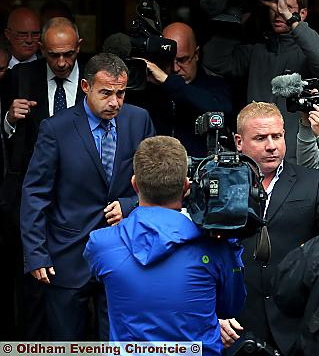Le Vell trial victim assessment ‘critical’ - judge
Date published: 10 September 2013

Coronation Street actor Michael Le Vell leaves Manchester Crown Court
The eight women and four men on the jury of Coronation Street’s Michael Le Vell have been told they must decide if the alleged victim is truthful or set out to “quite literally destroy the life” of the actor.
Le Vell (48) - garage mechanic Kevin Webster in the ITV1 soap for 30 years - is accused of sexually assaulting and raping the youngster, who cannot be named.
Judge Michael Henshell told the jurors at Manchester Crown Court their assessment of the alleged victim was “critical”.
If the Crown was right and she was a truthful witness, he said, then she was recalling traumatic events from an early age. But if she was dishonest she had come to destroy the life of the defendant.
Le Vell - tried under his real name, Michael Turner - denies five counts of rape, three of indecent assault, two counts of sexual activity with a child and two of causing a child to engage in sexual activity.
The jury was sent out at 3.51pm yesterday to consider its verdicts, and returned at 10.30am today.
Earlier, the jury was told by prosecuting barrister Eleanor Laws QC that Le Vell’s accuser had no reason to lie and the only explanation for her allegations was that it was the uncomfortable truth.
Asking jurors to disregard media reports, she said: “Concentrate on what you know because you, members of the jury, actually saw the alleged victim give evidence.”
Alisdair Williamson for the defence said it was a strange case of child rape, without any physical evidence. He suggested the girl had given differing accounts to her mother, her friends and to the police.
He added: “There’s an agonising lack of detail from this witness. She can’t give you details because it did not happen and that’s why her story varies according to who she’s talking to.”
Mr Williamson said the defendant was a “drunk, bad husband and inadequate father” whose behaviour was sometimes “terrible”, but he is not a child rapist.
He said no child pornography was found on Le Vell’s computer, no adults he knew were saying he was “odd” or they felt “uneasy” around him — “the sort of evidence these courts hear all the time”, the barrister added. “Nothing to support this girl’s inconsistent, incoherent and unbelievable account.”
Mr Williamson said the girl had been described as a “lovely” and polite, well–brought up youngster. “I’m sure she is,” he said, “but she’s damaged.”
He continued: “This has been, you may have thought, a prosecution by cliche. Mr Turner drinks a lot, he has his demons. What’s that supposed to mean? He has troubles. What’s that supposed to mean? That’s all the Crown can come up with for a motive.”
Mr Williamson asked jurors to find the prosecution’s “killer point” to convince them the defendant was guilty.
“There was nothing, whatsoever,” he told them. “He’s a man, a weak man, a stupid man, a drunk man, but nothing in this case has taken you anywhere near, I suggest, the level of certainty you would need so you can look in the mirror in the days that come and say, ‘I was sure’.
Most Viewed News Stories
- 1You can score free tickets to a Latics game while supporting Dr Kershaw’s Hospice
- 2Tributes paid following death of hugely respected Oldham community figure Dale Harris
- 3Primary school in Uppermill considers introducing new ‘faith-based’ entry criteria to tackle...
- 4Public inquiry announced into rail upgrade that could leave villages ‘cut off’ for months
- 5Trio arrested, drugs and weapons seized following Chadderton raid




